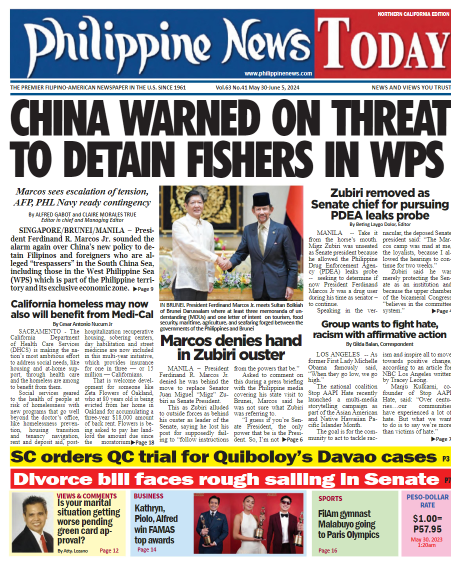GYEONGJU, South Korea – President Ferdinand R. Marcos Jr. joined Asia-Pacific leaders in concluding the 2025 APEC Economic Leaders’ Meeting on November 1, as member economies adopted the Gyeongju Declaration, a landmark commitment to harness artificial intelligence (AI), digital innovation, and inclusive growth across the region.
Marcos capped his four-day visit to South Korea commemorating All Souls’ Day by paying tribute to Filipino soldiers who fought in the Korean War.
Marcos, accompanied by First Lady Liza Marcos, led a wreath-laying ceremony and tree-planting activity at the United Nations Memorial Cemetery in Busan, where names of the members of the Philippine Expeditionary Forces to Korea (PEFTOK) are written in a Memorial Wall.
Marcos said he had a brief exchange with Chinese President Xi Jinping at the conclusion of the APEC Summit, saying it was a gesture of goodwill and respect, as China prepares to assume chairmanship of the annual meeting in 2026.
“It was just a very quick (encounter),’ Marcos told reporters.
“Sabi ko lang sa kanya (I just told him), ‘congratulations, we look forward to doing a lot of good work with you as APEC chair’. And he said, ‘thank you, thank you’. And that was it. There was really not very much to it.”
He said he made it a point to approach Xi at the end of the Leaders’ Retreat “out of common courtesy.”
The declaration, issued after two days of talks chaired by South Korean President Lee Jae Myung, reaffirmed APEC leaders’ pledge to strengthen cooperation and deliver economic growth “that benefits all,” recognizing that the rapid rise of AI and demographic shifts are reshaping labor markets and development strategies in the Asia-Pacific.
“APEC economies stand at a pivotal juncture,” the document states.
The region’s leaders vowed to be guided by three priorities – building the world’s most dynamic and interconnected regional economy; preparing the region for digital and AI transformation; and addressing challenges together and ensuring the benefits of growth are shared by all.
The leaders also endorsed the APEC AI Initiative, aimed at advancing AI transformation and building capacities across sectors, and the APEC Collaborative Framework for Demographic Changes to help member economies adapt to aging populations and shifting workforces.
The APEC leaders’ declaration can only be adopted by consensus, with support from every single member economy.
Marcos joined his counterparts for the traditional APEC group photo, all of them clad in mint-green scarves made of traditional hanbok fabric.
Lee also formally handed over the APEC chairship to Chinese President Xi Jinping, who will host the 2026 APEC summit in Shenzhen, China.
This year’s Gyeongju meeting, themed “Building a Sustainable Tomorrow: Connect, Innovate, Prosper,” marked the first time APEC leaders reached consensus on a collective response to digital and demographic challenges.
Future hosts were also confirmed – Vietnam (2027), Mexico (2028), Singapore (2030), Japan (2031), Chile (2032), Papua New Guinea (2033), and Peru (2034).
Marcos returned to the Philippines on November 2 from the APEC Economic Leaders’ Meeting in Gyeongju and Busan, South Korea, where he pushed for deeper economic, technological and defense cooperation.
In his arrival statement, Marcos said the discussions among APEC leaders tackled the most pressing regional challenges, from supply chain disruptions and climate change to artificial intelligence and economic inequality.
“Our engagements were robust, our discussions fruitful, and our shared commitment to collective action reaffirmed,” Marcos said.
“We saw alignment in the urgency for resilient growth, inclusive prosperity and sustainable development.”
Marcos said he advanced Philippine priorities during the summit, including narrowing the digital divide for micro, small and medium enterprises, promoting digital literacy, strengthening supply chain resilience, and improving infrastructure connectivity.
“These priorities were well-received,” the President said, adding that the Philippines’ proposals were reflected in the summit’s outcome documents.
On the sidelines of the APEC meetings, Marcos met with South Korean President Lee Jae Myung and Chilean President Gabriel Boric to reaffirm bilateral ties and expand cooperation in trade, innovation, and defense.
The President also held talks with top Korean conglomerates, including Samsung Electro-Mechanics, which signed a P50.7-billion expansion agreement and expected to generate 3,000 high-technology jobs for Filipino engineers and technicians.
He also discussed potential partnerships in advanced manufacturing, clean energy, and defense industries, notably with Hanwha Ocean, which has expressed interest in supporting the Philippine Navy’s submarine program.
Marcos concluded his visit with a meeting with the Filipino community in Busan, lauding their contributions and urging them to “stay united” in helping build a stronger, more resilient Philippines.
“Now as we return home, let us all carry forward the momentum that we have built — translating our commitments and agreements into tangible results,” he said.


















